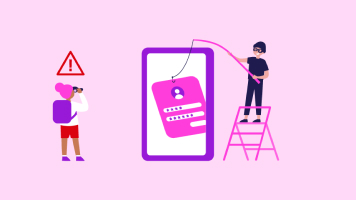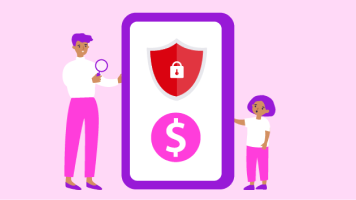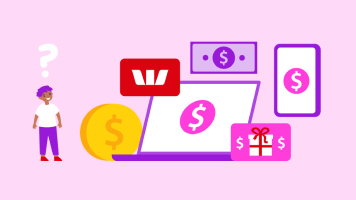Common types of scams and fraud you need to be aware of
There are loads of scams out there designed to steal your personal information or money through calls, emails, texts, social media and websites. Knowing the warning signs to look out for could help you stay safe.
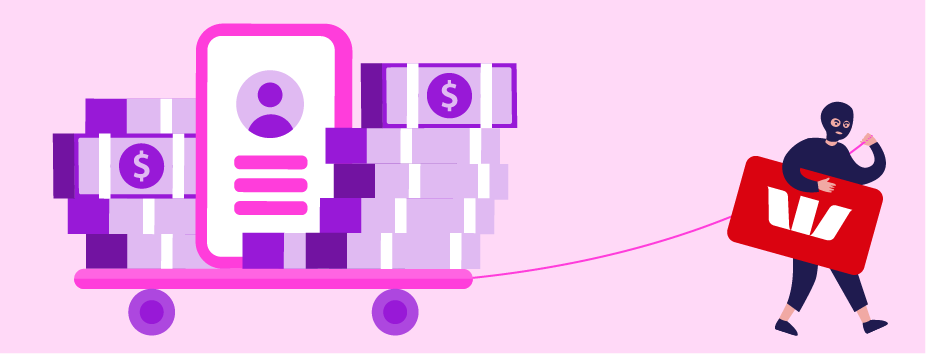
Unfortunately, there are scammers or fraudsters out there who will try to steal your money or personal information.
There are a lot of different scams: from a stranger pretending to be someone you know or trust, to a website claiming to be selling the latest clothing or tech at an incredibly low price.
Many of these scams create a sense of urgency, so you act without stopping to think about whether it might be a scam. Scammers always seem to say the right thing to get you to “act now” or “hurry”. They also know what to say to try and convince you that the message, offer or opportunity is real.
To help keep your banking safe, here are some of the common scams you need to be aware of. If you’re ever unsure, or something seems a bit odd or too good to be true, speak to your parents or a trusted adult right away.
Never feel pressured into clicking on links or downloading anything. If you ever feel that something isn’t right, close your browser or hang up your phone.
Phishing
Phishing is when a scammer goes “fishing” for your personal information.
Most phishing scams take you to fake websites that are designed to look just like trusted companies. Banks, phone and internet providers, and government agencies are often impersonated because we need to deal with those services on a regular basis. Popular brands are often targeted by scammers, too.
A lot of these scams generally work by sending you an email or text enticing you to visit a fake website.
For example, you could get a text saying your banking is locked for security purposes, with a link they want you to click on and instructions to enter your banking details to recover access. Scammers then use that information to try to steal your money.
Here are more examples of all the ways you might be “Phished” for money or your personal information:
- Scam emails or text messages: Scammers often pretend to be well-known companies and send requests for you to update payment information. Once you click these links you enter your login details, and banking information, which then means they may try to perform transactions from your bank accounts.
- Online quizzes. Some scammers will set up games or quizzes to gather information that can be used to steal your identity. For example, they may contain questions that ask you to reveal your first pet's name, your street address, or the year you were born. Be wary of quizzes that ask for any personal information – as this is often information you may use for security questions.
- Fake shopping websites: No one likes paying full price for an item when they don’t have to – and scammers know this. Just because you find a pair of brand name shoes at a cheap price, it doesn’t mean they are real or genuine. You might end up giving the website heaps of information and your card details, only to find a scammer uses this information to make other purchases from your account.
- Messages or emails pretending to be someone you know or care about: Scammers can pose as someone you care about, like your mum or dad. These emails or messages often sound desperate and include a request for money.
- Texts, chat apps and social media messages: Most of us chat to our friends and family online. Scammers take advantage of this and can set up fake profiles to impersonate people they believe you will chat to and to create trust with.
- Phone calls: Scammers may even try calling you – pretending to be a company requesting that you update your information, or with a special offer.
Remember, your bank will never ask you to...
- Share your Online Banking Security Codes or passwords
- Share your Credit Card expiry date, PIN or CVC
If someone calls to ask you for this information, even if they claim to be Westpac, just hang up and call us back on 132 032.
Identity theft
Identity theft is when a scammer uses personal information that they’ve stolen from you to pretend to be you and open new accounts – from bank accounts to social media profiles.
People trying to steal your identity will piece together any information they can to be able to pose as you.
Phishing is one way this can happen, but identity theft can also happen in other ways, too – like if you accidentally leave your email or other online accounts open on a public computer, or misplace papers that contain personal information like your address and birthday.
To avoid identity theft, be cautious of where and what personal information you provide to websites or hold in a physical document. If you keep paper copies with personal information, keep these organised and in a safe place. If you are throwing documents away, shred them into small pieces and don’t put the pieces in the same bin.
Buying and selling scams
Scammers advertise items for sale on common online marketplaces, like Gumtree or Facebook. Once you’ve paid for the item, they either don’t send you the item at all, or they have sold you a fake or counterfeit item.
Fake ads can have spelling mistakes and poor-quality photos, and it’s usually priced too good to be true. The seller may also ask you for personal information or a deposit before viewing the item, in order for them to hold it for you.
To avoid buying and selling scams: When shopping online, only buy from reputable companies or individual sellers with a good reputation. Only ever pay with a secure method like a debit card or credit card, PayID or established payment services such as PayPal (credit cards are available when you’re 18 or older). Never save your card details in online stores.
PayID scam alert: Sometimes (but not always) when you use PayID, you could get a message saying you need to upgrade your PayID to a business account and pay a fee to do this. This will always be a scam – PayID is free and managed through your bank and does not require fees or upgrades.
If you’re using the Westpac App your digital card will have a dynamic CVC for extra security. What’s a dynamic CVC? A CVC is the three-digit code that you usually find on the back of physical cards and a dynamic one changes every 24 hours. This means that if your details get into the wrong hands, the scammer has less time to use it.
Investment scams
Investment scams offer opportunities to “grow your money” or try to get you to sell to your friends and family – with payouts that seem too good to be true. They might use fancy websites or apps to show how, if you give them money, they can grow it for you in a short amount of time – but when it comes to getting paid or cashing out the investment, the money is never transferred to you.
Deep fake scams
With so many influencers doing paid partnerships with brands and products, it can be even harder to work out when someone is genuinely promoting a product or not.
To make matters more complicated, scammers can use images and emerging technology, such as AI, to create ads that look like celebrity or influencer endorsements for these scams – but they are actually fakes. These are often referred to as deep fakes as they use “deep machine learning” to generate very convincing images or videos of someone else.
Threat and extortion scams
Some scammers pose as friends or trusted organisations as a way of luring you into sharing personal information or even intimate photos or videos of yourself.
They might contact you through social media, dating apps or gaming apps and in many cases will set up fake profiles so that you don’t know who they really are.
Once they’ve received the information from you, they may use it to pressure or even blackmail you into sending them money.
Always talk to a parent or trusted adult if you are ever pressured or asked to share images or personal information, or to send money to prevent personal images or information from being shared.
Friendship and romance scams
Some scammers might try extra hard to be your friend or express strong and even romantic feelings for you. They may “love bomb” you by sending loads of messages daily, compliment you constantly, or encourage you to make plans for the future – even though you’ve only known each other for a short period of time and have never met in real life. Their goal is to try and make a connection with you and build up your trust before asking you for money or your personal details.
As we mentioned, you must be extra cautious of sharing personal details about yourself when connecting with new people who you have never met in real life, as people aren’t always who they say they are.
Speak to your parents or a trusted friend straight away if someone unknown is sending you messages that are overly affectionate or feel inappropriate in any way, and never provide any information or money to someone you have not met in person.
Job scams
Things that seem too good to be true usually are. Scammers can send emails, text messages, social media posts, or call you to let you know of an amazing opportunity to earn quick and easy money. These are often for amazing jobs (that you never applied for) like acting, product testing or working from home to earn hundreds or even thousands every day for not much effort.
Often, they will employ you without ever meeting you in person or conducting an interview to understand your skills. You may be asked to send personal information or make a payment upfront for training fees on the promise you will get it back in your first pay.
Never respond to job applications like this – particularly when they include a request for personal information or ask you to pay money to apply.
Scams are always changing: While these types of scams here are common now, always be on alert as scammers are constantly coming up with new ways to take advantage of people.
Always speak to your parents or a trusted adult if you ever have any questions or concerns about a website, message or person online.
You can also visit our Security Hub to stay on top of the latest scams that may be affecting Westpac customers.
Q&A: Which one seems like a scam?
Read through the three situations below. Which one is suspicious and should be treated as a scam? Scroll to the bottom of the page for the answer.
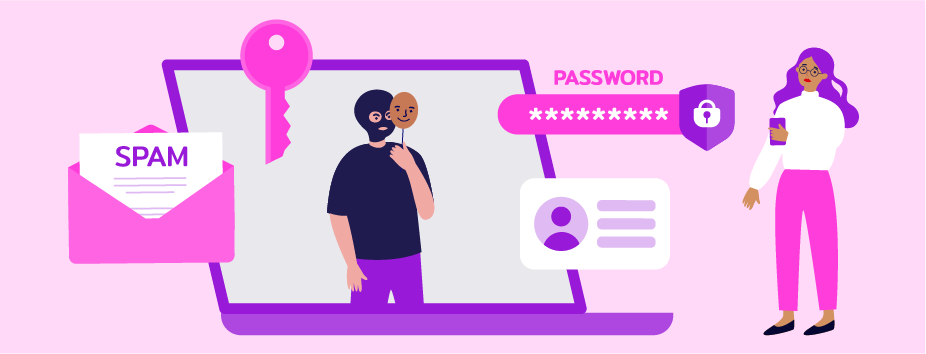
- Your friend texts you to remind you that you’re meeting up on Friday after school to do homework. You’ve discussed this with them in person before.
- You get an email from your teacher asking you to pay for the school trip using the link below. You don’t remember hearing about a school trip and your parents usually pay for trips on a different website.
- You are buying a pair of shoes on a website that your mum showed you. Before you make your purchase, you are prompted to log in with your email and password.
Answer: 2 is suspicious. If the email contains information you aren’t familiar with and is asking you to pay for something you aren’t aware of, you should not click on anything, delete this email and speak directly to the person to see if they sent it.
You may find these useful
Things you should know
This information is general in nature and has been prepared without taking your objectives, needs and overall financial situation into account. For this reason, you should consider the appropriateness for the information to your own circumstances and, if necessary, seek appropriate professional advice.
Westpac’s Online Banking Security Guarantee - If your Westpac account is compromised as a result of online fraud, we guarantee to repay any missing funds, providing you comply with our Online Banking Terms and Conditions. This includes keeping your sign-in details (including passwords, Westpac Protect™ SMS codes and SecurID® Token codes) private. You must inform us immediately if you suspect the security of your access details has been compromised, or you suspect an unauthorised transaction or potential fraud on your accounts.
